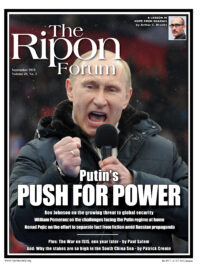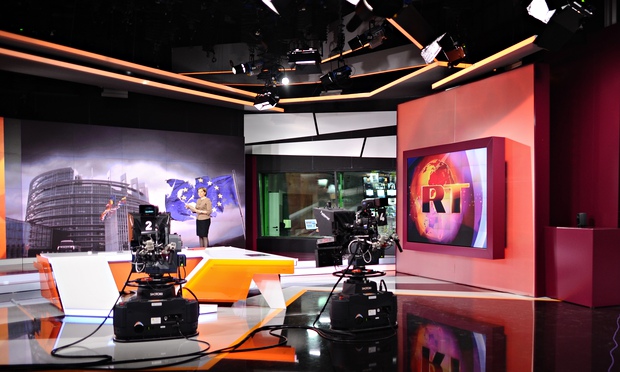
The first Radio Free Europe broadcast, to then-Czechoslovakia, took place on July 4, 1950. Over the past 65 years, one set of authoritarian regimes has passed into the “dustbin of history,” many say with the help of what is now known as Radio Free Europe/Radio Liberty (RFE/RL). Many of them have thrown off decades of repression, actively seeking to build prosperous, law-based societies, and have entered the European Union and NATO.
At the same time, new, more modern authoritarians have appeared in places like Azerbaijan, Belarus, Iran, Russia, and Central Asia, all doing their best to control what their people know about their own societies and the world, and keep an iron grip on their continued access to wealth and power.
As the challenges facing RFE/RL’s 20 language services have evolved, so has this quintessentially American “surrogate” journalistic institution. RFE/RL seeks to open minds and engage with audiences in support of bedrock values such as democracy, free markets, and the right of all people to “seek, receive and impart information and ideas through any media and regardless of frontiers,” as the Universal Declaration of Human Rights states.
Today, this mission is as urgent, and arguably more complex, than it was during the Cold War.
As Russia attacks the post-World War II security structure, RFE/RL’s task has less to do with outsmarting censors – although new Russian laws are constantly expanding authorities’ power to police content – than cutting through a haze of lies and absurdities designed to blur fact and fiction and overwhelm reason. The Russian media’s treatment of the downing of flight MH17 last year is a case study in the use of numerous, competing scenarios – none factual and few plausible but all reportedly possible – to debase the truth. From there, it is only a short step to discrediting the very premise of fact-based journalism.
As Russia attacks the post-World War II security structure, RFE/RL’s task has less to do with outsmarting censors than cutting through a haze of lies and absurdities designed to blur fact and fiction and overwhelm reason.
Added to this no-holds-barred content is Russia’s use of the free-for-all of the Internet to promote its objectives. An information revolution of massive proportions has taken place since the Berlin Wall came down. The openness of the information space we are contesting is a radical change from the days when our job was fundamentally about access – getting information past the Iron Curtain.
RFE/RL’s response, and that of our sister U.S. international media networks Voice of America (VOA), Radio/TV Marti, Radio Free Asia, and Radio Sawa/Alhurra Television, combines a commitment to professional, verifiable journalism with technologies that afford us maximal reach and audience engagement. RFE/RL’s Russian and Ukrainian language services provide 24/7 programming on the web, social networks, mobile phones, radio, and TV to report the news, investigate local problems, and engage audiences directly on the issues that matter to them.
To extend our reach further, in October 2014 we launched Current Time, a Russian-language, political affairs TV program co-produced with VOA that provides audiences in countries bordering Russia, including the Baltic states, with a balanced alternative to Russian state media. It’s a reality check, and its impact already is such that we will debut a version of Current Time for countries in Central Asia this fall. We are also setting up a Russian-language digital response team to grow our footprint on social networks, and increasing TV programming to be more present on the region’s leading medium for news.
These efforts have borne fruit. RFE/RL’s audience grew by five million over the last year, now totaling more than 23 million users globally. In 2014, RFE/RL videos were shown by 800 TV stations in 60 countries. Our YouTube channels are among the most watched in several of our broadcast languages. And we are leading U.S. International Media on digital platforms. Our programs are relevant and credible, and they are read, heard, and watched.
It is estimated that Russia spends in excess of half a billion dollars annually on RT, its state-run English language mouthpiece. By comparison, RFE/RL’s budget is $104 million.
As for our response to the militant group Islamic State, or ISIS, and extremist propaganda, RFE/RL’s mission of critically engaged, surrogate journalism is our guide. We report the facts about ISIS and the personal stories of its recruits, exposing the truth about the organization and helping to blunt the power of its propaganda. We are drawing on our experience with extremism in the Balkans, Russia, Central Asia, Afghanistan, Pakistan, and Iraq to create programs countering militancy among youth. In Afghanistan, a would-be suicide bomber once called our Afghan Service and said he abandoned his mission after listening to its programs. We can learn from this.
Congress has given RFE/RL a mandate to practice journalism in the service of democracy, international security, and human rights in some of the most difficult environments in the world. It is not uncontested terrain; indeed, we face competitors with aggressive foreign policy agendas and robust media operations to advance their interests.
For example, it is estimated that Russia spends in excess of half a billion dollars annually on RT, its state-run English language mouthpiece, and other media targeting audiences abroad, including in the periphery. Similarly, China Central TV began a huge expansion into foreign markets in 2008, with estimated costs in the billions.
By comparison, VOA’s budget for 47 languages this fiscal year is $212 million, while RFE/RL’s budget – spread among 20 languages – is $104 million. My RFE/RL colleagues and I have the expertise and the determination to carry out our mission. With Congress’s help, we can achieve the outcomes we seek.
Nenad Pejic is Editor-in-Chief of Radio Free Europe/Radio Liberty.





